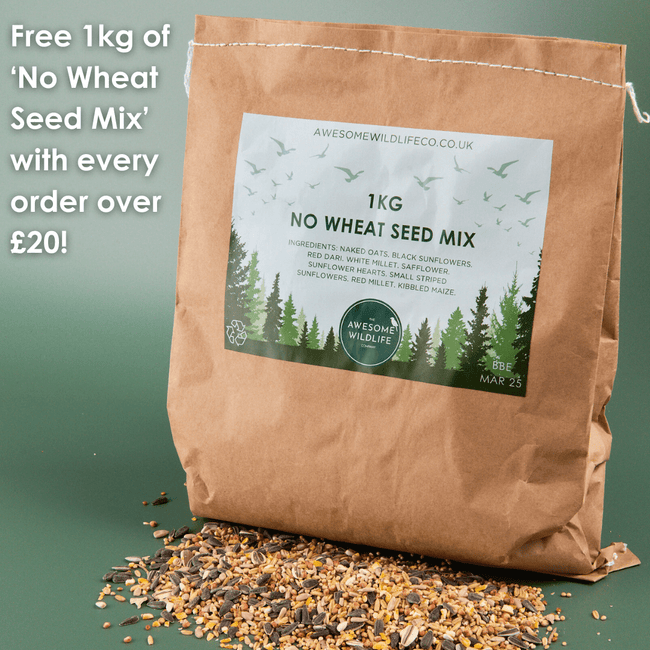What to Feed Birds in Winter Months
As winter blankets our back gardens, outdoor spaces and countryside in twinkly frost and white snow, the survival of our feathered friends becomes an important consideration.
The chill of winter poses unique challenges for our wild birds, making it essential to provide nourishment that sustains them through the cold months. From energy-packed seeds to suet cakes and mealworms, this blog aims to be your compass in creating a bird-friendly haven during winter, offering insights into the best nutritional choices to support many birds in their quest for warmth and sustenance.
This blog post, written by the experts here at the Awesome Wildlife Company, will teach you the art of winter bird feeding to bring joy and vitality to your local avian community, and attract birds to your garden when we experience severe weather conditions.
What to put in your bird feeder or bird table
In the winter months, providing the right seeds and nuts in your bird feeder or on your bird table becomes crucial for their survival and well-being. Feeding wild birds should be an enjoyable and enriching experience, however before you start feeding birds its important to understand what natural food and fresh food they can enjoy.
Remember when you feed birds, there are some foods which are suitable for human consumption which are not suitable for birds. Bear in mind that birds die from improper food sources or poor feeder hygiene.
Sunflower seeds, whether in the shell or hulled, are a nutritional powerhouse and a perennial favourite among many different birds. Packed with essential fats and proteins, they offer a high-energy food source, vital for maintaining body temperature in the cold.
Niger seeds, also known as thistle seeds, are particularly favored by finches, robins, blue tits and other small birds, supplying them with the necessary oils, precious energy and calories needed during winter's harsh conditions and cold weather.
For ground-feeding birds such as sparrows, millet is a budget-friendly option, and provide birds with both energy and sustenance.
Feeding peanuts to birds in winter can be a nutritious and energy-packed choice. Many birds eat peanuts and they are rich in fats and proteins, providing essential calories that help birds maintain their energy levels during the colder months. Ensure the peanuts are unsalted and free from any additives, as this ensures the health and well-being of our feathered friends.

Consider mixing these seeds in a variety of feeders to accommodate different bird species and their feeding habits. By offering a diverse selection of bird seed in your garden, you not only contribute to the health of your feathered visitors but also enhance the winter birdwatching experience, creating a haven of sustenance that brightens the chilly days for both birds and bird enthusiasts alike.
Offering nuts and seeds in suitable feeders or by scattering them on bird tables provides something for the birds to eat whilst contributing to the vitality of your local bird population during the challenging winter season when food is often in short supply.
When you feed birds the correct food in winter you help encourage birds visiting your garden year round.

What shouldn't I feed garden birds?
While feeding birds can be a rewarding experience, it's crucial to be mindful of foods that may be harmful to their health.
Avoid offering dried fruit as it often contains high levels of added sugars and preservatives, which can be detrimental to birds' well-being.
Similarly, cooked rice poses risks; if not consumed immediately, it can develop harmful bacteria that may harm birds upon ingestion.
Processed and salty foods, such as crisps or crackers, should be excluded, as excessive salt intake can be harmful to avian kidneys.
Moldy or spoiled seeds can carry aflatoxins, posing a serious threat.
Finally, steer clear of offering dairy products, as many birds are lactose intolerant, and dairy can lead to digestive issues. Prioritise the well-being of your feathered friends by providing a balanced and bird-friendly diet, avoiding these potentially harmful food items to ensure their safety and overall health.
What containers should I leave bird feed in?
Selecting the right containers for bird seed is essential to ensure its freshness and to accommodate the diverse feeding habits of our avian friends.
Bird feeders are perhaps the most popular choice, coming in various styles like tube or platform feeders, each catering to different bird species. Tube feeders are ideal for small seeds and feed like sunflower or nyjer seeds, while platform feeders accommodate larger birds and various seed types.
Hanging fat balls, a winter favourite, can be placed in specialised containers or suspended from trees and hooks. These high-energy treats attract a variety of birds, especially those seeking supplemental fats during the colder months.
Bird tables provide a spacious and open feeding area, allowing ground-feeding birds like sparrows to enjoy seeds comfortably. Opt for tables with roofs or overhangs to shield the seeds from rain and snow, preserving their quality.
Additionally, containers should be durable, easy to clean, and positioned strategically to deter squirrels and other potential seed thieves.
You can also leave fresh water out on the ground in a dish or on a bird table. This is especially helpful for sick birds who may need easy access to drinking water. You could also consider purchasing bird baths, providing smaller birds the chance to bathe and clean themselves whatever the weather. Just ensure that the water hasn't frozen over on super cold days!

Why is it important to clean bird feeders thoroughly?
Thoroughly cleaning bird feeders is of paramount importance for the health and well-being of our garden birds. Over the summer months, residual seed hulls, droppings, leftover bird food and moisture can accumulate in feeders, creating an environment conducive to the growth of harmful bacteria, mold, and parasites.
Regular cleaning helps prevent the further transmission of avian diseases, protecting the delicate immune systems of the birds that frequent the feeders. Moist conditions can lead to the formation of aflatoxins on damp or spoiled seeds, posing a significant health risk to birds. Cleaning your feeders regularly is literally a life saving task which cannot be underestimated.
Moreover, clean feeders attract a greater variety of birds and ensure a positive feeding experience. Birds are more likely to return to feeders that offer fresh, uncontaminated seeds, enhancing the overall diversity and enjoyment of birdwatching. Routine cleaning also helps maintain the structural integrity of feeders, extending their lifespan and preventing potential hazards like moldy or spoiled seeds that could harm the birds.
In the winter months, when resources are scarce, maintaining clean feeders becomes even more critical. Bird enthusiasts should adopt a regular cleaning schedule, using a mild bleach solution or specialised bird feeder cleaning products, to promote the health, safety, and diversity of their avian visitors

How to choose a bird table or bird feeder
When selecting a bird feeder or bird table, consider the types of birds you wish to attract and the feeder's design.
Tube feeders suit small birds, while platform feeders accommodate larger species. Opt for durable, weather-resistant materials and easy-to-clean designs to maintain bird health.
Position feeders strategically, away from potential predators like cats, with a clear line of sight for birds to detect threats. Place feeders near natural cover, like bushes or trees, offering birds a quick escape.
Regularly clean and refill feeders to ensure a continuous, safe, and appealing food source for your feathered garden guests.
If you would like to find out more information about buying a new feeder, or you wish to speak to someone about the best way to encourage birds into your garden year round, speak to one of the experts at the Awesome Wildlife Company today.










